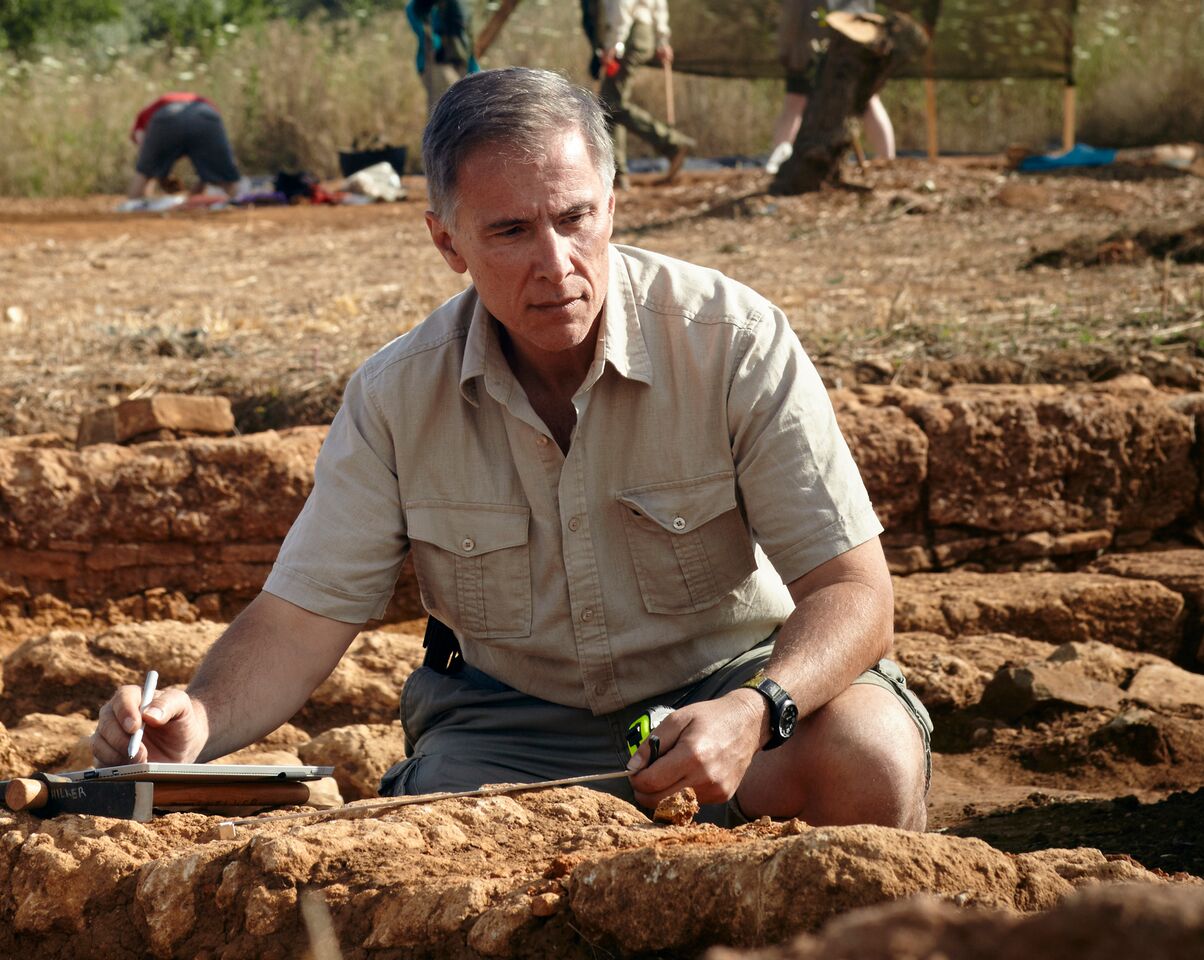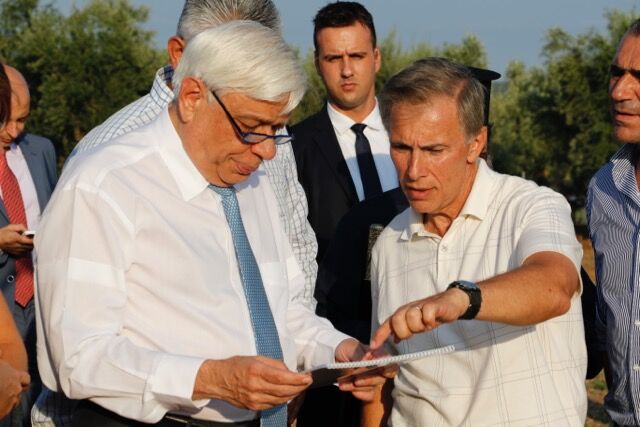By David Bjorkgren, Editor
Special to the Hellenic News of America
Clay tablets from Greece may hold clues about an ancient government that resembles America’s federalist system. One clay tablet in particular may tell us about the oldest form of government in western civilization.
Prominent archaeologist Dr. Michael Cosmopoulos is conducting research into the rise of the state in ancient Greece, focusing on an archaeological site near the modern village of Iklaina.
Found tablets suggest a two-tiered government existed during the Bronze Age in Greece, between 1600 and 1100 BC, known as the Mycenaean period. It was an exciting time in Greece, when the Trojan War was raging and the myths familiar to us today were created.
One of the kings who fought in the Trojan War was Nestor, a major figure in Homer’s Iliad. Nestor ruled over seven capital cities, the Iliad tells us.
Archeologists have figured out that a government was in place during Nestor’s rule because of the more than 1,000 tablets they found at his main palace in Pylos. The tablets were the royal archives, containing tax and property records.
“The existence of tablets instantly means state structure, bureaucracy,” says Dr. Cosmopoulos. “They needed a way to keep track of their property and the movement of troops, so writing developed in the form of tablets just for that reason.”

What is significant about Nestor’s bureaucracy is that prior to the Mycenaean period, there was no such thing as state bureaucracy.
“We live in a world where states and governments dominate everything in our lives but it was not always like this. There was a time, a period in history where there were no states,” he says.
People lived in villages, in tribes or in chiefdoms. At the beginning of the Mycenaean period, around 1500 BC, some of the chiefs started to grow more powerful through war and violence. They conquered other territories, folding them into what they already controlled. When the chief’s domain grew large enough, it evolved to the point where they ruled over semi-independent districts overseen by a central government.
Enter King Nestor and his rule over the nine capitals. Based on the tablets found at his main palace, it had been reasoned by archaeologists that Nestor’s government was created from the top down, with decisions coming from this palace.
Then they found the site near Iklaina, along with another clay tablet that should not have been there. The tablet, proof of government record keeping, was created between 1450 and 1350 BC and found at a location outside the assumed sites of power. Dr. Cosmopoulos, who has directed the Iklaina project since 1999, believes this shows government was in place 150 to 200 years earlier than archeologists thought and that there were other influences helping to create and maintain the state beyond the main palaces. The tablets found at the main palace mention the site near Iklaina as one of several district capitals. The city also gets a mention in Homer’s Iliad.

“We have a case of a city where it is at a crossroads between mythology (Homer) and archeology,” says Dr. Cosmopoulos. “The excavation has shown there were important factors that led to the creation of states outside the central capitals of the early Greek world,” he says.
Until Iklaina, archeologists had only a limited view of the state in ancient Greece.
“It would be like trying to understand the history of the United States based only on evidence from Washington DC and not having any idea what’s happening around the country,” he says.
The earliest forms of recorded states in western civilization are in Greece. At Iklaina, “we can study the transition from a world without states to a world where states were the dominant political institutions,” Dr. Cosmopoulos says.
Greece got its organized government early because its people were interacting with civilizations like Egypt, where the state already existed. Relationships with places like Egypt meant Greek society had to evolve earlier on from simple agriculture to more complex cities. The genius of the Greeks was that in a very short time they turned these early governments into the first democratic states in the world.

A modern federal government shares similarities to the Mycenaean state, in that it has a two-tiered administration. Evidence from the tablets indicates there was a central government and the district capitals that retained a certain level of independence and autonomy, a distant cousin to America’s division of federal and state powers.
“Our culture in 21st Century America is not disconnected from other cultures in time and space. We are part of the same chain, just the latest link in a long chain of development,” Dr. Cosmopoulos says. Research like his is not a theoretical abstract, but produces knowledge that is relevant and useful to today’s societies. He believes it is crucial that we study history, discover its patterns, and improve ourselves by not repeating mistakes from the past.
Dr. Cosmopoulos was born and raised in Athens, where he did his undergraduate work in history and archaeology. His mentor in Greece, retired Washington University professor George Mylonas, worked with him at the Mycenae excavation site and helped him get a scholarship to Washington University in St. Louis, MO.
Dr. Cosmopoulos came to the United States in 1985 to pursue his PhD in classical archeology at Washington University. Afterwards, he was offered a position at the University of Manitoba in Canada and taught there from 1989 to 2001.
He is the author of 15 books and more than 100 articles and scholarly papers on ancient Greece. In addition to Iklaina, he has excavated the ancient sites of Eleusis, Mycenae, Epidaurus, Ancient Corinth, Ithaca, Pylos, and Oropos.

One of those sites, Eleusis, was the sanctuary of an ancient mystery cult devoted to Demeter, Goddess of Agriculture, Nature, Fertility and Life. Mystery cults were a secret movement that operated parallel to the public worship and celebration of the Greek Gods. About 2,000-3,000 people participated every year in the Demeter cult, which focused on the cycles of life. The cult met every year for a thousand years, he says. Between 1000 and 700 BC, changing attitudes toward death created a salvation element to the cult, helping them overcome a fear of death and hope for a better afterlife. He credits the cult with contributing to the development of Christianity.
His interest in archeology and ancient Greece grew out of his efforts to understand the world and our place in it. “The only way we can be happy in life is if we understand who we are inside and also what the forces are that affect our lives on the outside,” he says. “The Greeks were the first culture in our world that tried to understand humanity, what makes us human, what makes us happy.”
It is one reason the concept of Democracy emerged in ancient Greece. Greeks have a strong sense of independence. “This sense of independence and personal worth gave rise to the idea of equality, that people are equal in society and no person should have more rights because they were born rich, for example, or are in an aristocratic family or in a privileged set.”
Today, Democracies are at risk, he says. Democracy requires its citizens to be critical thinkers, to be critical of administrations when needed, to be aware of the issues. “Otherwise, it’s Democracy only by name,” he says. “That’s why I’m so concerned about the status of our universities, of our schools. Without good solid education that helps young people develop critical thinking, people run the risk of becoming ideological puppets. Their vote will be based on appearances, not on substance.”
Dr. Cosmopoulos continues his research while also serving as the Endowed Professor in Greek Studies at the University of Missouri in St. Louis, a position he has held since 2001. It is the oldest professorship in Greek Studies in the United States, established 20 years ago. The position is supported by the local Greek community, the Greek government and the state of Missouri.
Because he is an archaeologist, he has been able to offer study programs for his college students in Greece where they have an opportunity to excavate and study. Most of his students are not Greek American. “Students came back saying they were homesick for Greece. They were homesick and I thought that was very touching because they found a connection with the place and the culture.”
On Nov. 24, 2017, the Royal Society of Canada (the National Academy of Arts and Sciences) inducted Dr. Cosmopoulos recognizing his 30 years of contributions to the study of ancient Greek civilizations. “I was a little surprised but very grateful, very honored,” he said. He’s also been inducted into the European Academy of Arts and Sciences and the Academy of Sciences in St. Louis. “My work is being recognized but it also comes from being older,” he jokes.
Dr. Cosmopoulos is married to Dr. Deborah Ruscillo, a fellow archeologist and research associate at Washington University. She is also the head of the science department at Barat Academy. They have three children, two sons, ages 14 and 11; and a daughter, 13.






